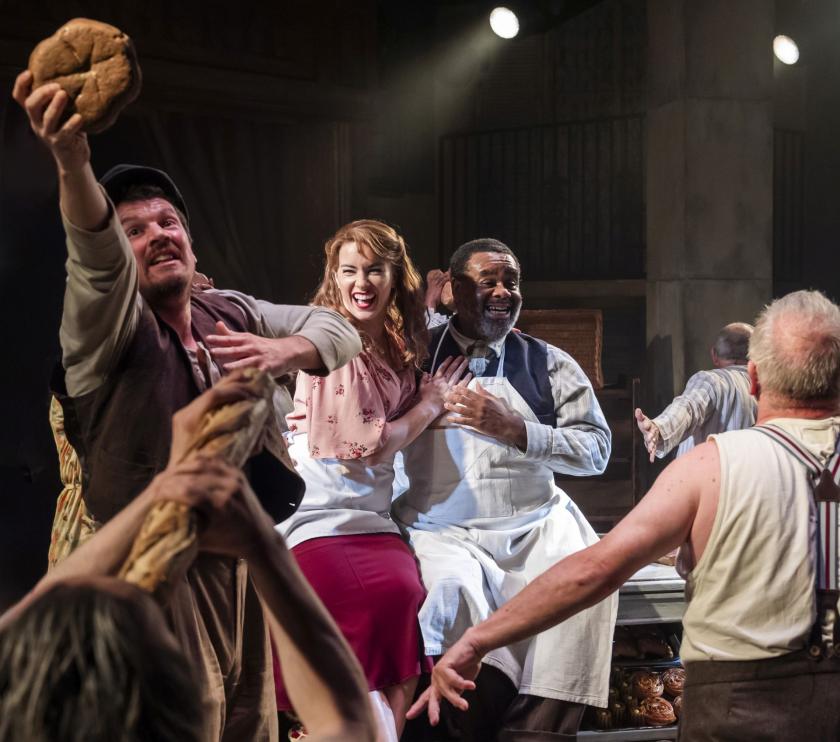The Baker's Wife closed on the way to Broadway in 1976, since which time Stephen Schwartz's stubbornly resistent if sweetly scored musical has been revived and reworked all over the map, not least by Gordon Greenberg. The American director has tackled the show three times previously on his native soil and is now marking his retour to the Gallic gathering it puts before us at the venue where he previously directed Barnum.
I'd love to report that the show this time flies, much like the meadowlark in the ravishing first-act solo number from the title character that remains the takeaway song from a score written when the composer of Wicked and the Broadway-bound Queen of Versailles wasn't yet 30. Like Fiddler on the Roof, whose book writer Joseph Stein went on to perform the same task here, The Baker's Wife tells of the tensions that beset a village community - in this case not in rural Russia but provincial France, where the arrival of a baker called Aimable (Clive Rowe) and his wife Genevieve (Lucie Jones, pictured below) has an effect on appetites both culinary and carnal.
 Lots of what's on view is just right, starting with yet another astonishing set at this address from Paul Farnsworth, who encloses the audience quasi-immersively in the sort of picturesque town you dream of stumbling across on holiday, period shutters and signage on view and several playgoer-patrons brought directly into the cafe society. There's an ever-so-slight touch of audience participation towards the end, but not enough to scare those content simply to watch the large, name-heavy cast play petanque.
Lots of what's on view is just right, starting with yet another astonishing set at this address from Paul Farnsworth, who encloses the audience quasi-immersively in the sort of picturesque town you dream of stumbling across on holiday, period shutters and signage on view and several playgoer-patrons brought directly into the cafe society. There's an ever-so-slight touch of audience participation towards the end, but not enough to scare those content simply to watch the large, name-heavy cast play petanque.
And the ensemble is so distinguished that you can't quite believe all these people have agreed to work Off West End in shared dressing rooms, though there must be an undoubted cachet that comes from pitching up at the very theatre that spawned the just-closed Broadway revival of Merrily We Roll Along. I saw that show three times in New York, and it was the success story (and how) of many a Broadway season.
But musicals are delicate beings, and the intimacy of this production also exposes the shortcomings at the core of the material. While it's nice to get up close and personal with a show that was scaled up for its shortlived West End run in 1989, directed at the time by Trevor Nunn as a star vehicle for his then-wife Sharon Lee Hill, the featherweight story really does need further fine-tuning.
This adaptation of Marcel Pagnol's 1938 film La Femme du Boulanger is in essence a fable, as is fair enough, but an awful lot has to be taken on faith.
Much of what we see consists of the workings of village life: marriages curdled in frustration, or enmities so longstanding that neither party can quite remember where the animosity began. And the villagers are in the collective embrace of Olivier nominees, winners and general theatre mainstays that includes Josefina Gabrielle as the tart-tongued Denise, whose "Chanson" provides a thread throughout; Finty Williams in moving form as the abject Hortense; and real-life brothers Matthew and David Seadon-Young as a man of the cloth on the one hand and one prone to the bottle on the other. Oh, and isn't that Norman Pace as well? Indeed it is, playing a cafe proprietor locked in combat with Denise.
The story itself tells of the excitement accompanying the arrival to this breadless community of the sweet Aimable - the wizardly baker's name says it all - who has come to restore carbohydrates to a community whose previous drunk of a baker fell into a pot, we're told, and broke his neck. At risk this time round are broken hearts: the young and comely Genevieve catches the eye of a young galahad called Dominique (Joaquin Pedro Valdes), who has barely laid eyes on this newcomer to his midst before he starts romancing her Romeo-style. The pair disappear, and so, in mourning for his wayward love, do the baker and his mouthwatering way with a brioche.
Before you can invoke Descartes, who in fact does get namechecked, this riven society gets a lesson in what nowadays might be referred to as slut-shaming. All involved come to their senses more by authorial fiat than common sense, and you can't help but clock narrative ellipses that Schwartz's enchanting score - the company numbers land alongside the solos - can't make cohere.
One wishes here and there for slightly more confident vocals, as has been true of late at numerous playhouses around town in fact. But it's wonderful to see Rowe given an opportunity to which the veteran of Carousel and Guys and Dolls responds with a mixture of arduor and anguish that feels just right. And Jones, whose run in Waitress must have attuned her to musicals themed around food, is genuinely enchanting in the somewhat cryptic part of a woman upon whom the many and varied people in her orbit project their desires. On some level, Genevieve is as unknowable as Stein's book is unworkable, but have a hearty cognac beforehand and all cavils may, well, fly away.















Add comment